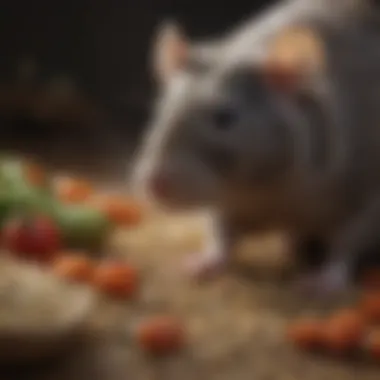Understanding Rat Food: Nutrition and Best Practices


Intro
Understanding the dietary requirements of pet rats is crucial for their overall health and well-being. These small mammals, highly social and intelligent, thrive on a balanced diet that meets their unique nutritional needs. This guide focuses on various aspects of rat nutrition, choices available to pet owners, and best practices to ensure a healthy feeding regimen. By addressing common myths and providing realistic feeding approaches, you are empowered to make informed decisions for your pet’s diet.
Understanding Your Pet
Pet Behavior Basics
Rats are social animals, often requiring interaction both with their owners and other rats. This social need influences their feeding habits as well. When pet rats feel secure and engaged, they are more likely to eat well. Observing their behaviors can give insights into their dietary preferences. Some may prefer nibbling on certain foods, while others might be more curious.
Common Breed Characteristics
Different breeds of rats may have slightly different nutritional preferences or needs. For example, some breeds might require higher protein levels due to their activity levels. Commonly kept breeds include the Dumbo, Hairless, and Standard rats. Knowing the breed specifics can help you tailor the diet better to suit their physiological needs.
Species-Specific Needs
Rats have specific dietary requirements that differ from other pets. They need a balanced mix of proteins, carbohydrates, fats, vitamins, and minerals. A diet solely based on commercial rat food might not always suffice. Supplementing their diet with fresh fruits and vegetables can help provide the necessary nutrients. It is essential to ensure that food choices are species-appropriate to prevent health issues in the long run.
Pet Care and Maintenance
Feeding Guidelines
Feeding your pet rat a well-rounded diet is vital. A general recommendation is to offer commercial rat food that contains high-quality pellets as a base. The pellets should be supplemented with fresh produce like peas, carrots, and apples. Avoid items that are toxic to rats, such as chocolate or caffeine. Monitor portion sizes to prevent obesity, which can lead to other health concerns.
Grooming Essentials
Rats typically maintain their cleanliness, but regular grooming can aid in their health. Brushing them occasionally removes loose fur and helps you check for any signs of skin issues. Consider using small grooming tools specifically designed for rodents to make the process easier and more enjoyable for your pet.
Hygiene Practices
Maintaining a clean living environment is essential for your pet's health. Regularly change bedding material and clean out cages to prevent the buildup of waste. This practice not only keeps your rats healthy but also reduces odors in your home. A clean habitat directly impacts their overall well-being and can even influence their appetite.
Training and Development
Basic Commands and Skills
Training your pet rats can be rewarding. Teaching them basic commands can promote a structured feeding routine. Begin with simple actions like
The Importance of Proper Nutrition for Rats
Proper nutrition forms the cornerstone of a rat's well-being and longevity. Rats are omnivorous creatures, and their diet is critical to their overall health. Inadequate nutrients can lead to serious health concerns, impacting not just physical development but also behavior and lifespan. Understanding the fundamentals of rat nutrition enables pet owners to make informed choices about their pets' food, fostering a happier and healthier life for their rats.
Why Diet Matters
The diet of a pet rat plays a significant role in its day-to-day life. A well-balanced diet ensures that rats receive essential nutrients needed for proper bodily functions. Key aspects of a rat's diet include adequate amounts of proteins, fats, carbohydrates, vitamins, and minerals. These elements contribute to energy levels, organ function, immune system support, and overall growth.
Rats, like humans, require variety in their diet to thrive. A monotonous food regimen might not fulfill their nutritional requirements, leading to deficiencies. Providing diverse foods not only ensures better health but also keeps feeding times interesting for the pet. It encourages natural foraging behaviors, which can be beneficial for mental stimulation.
In summary, proper diet affects rats on multiple levels. It supports physical health, enhances cognitive functions, and contributes to a long life. Understanding this impact can lead to more conscious feeding practices among rat owners.
Health Implications of Poor Nutrition
Neglecting nutritional needs can cause a variety of health issues in rats. A diet lacking in essential nutrients may lead to obesity, malnutrition, or other chronic conditions. For instance, insufficient protein intake can hinder growth and repair of tissues, while inadequate fiber may disrupt digestive health.
Rats often face health problems such as:
- Obesity: Excessive fat intake and lack of exercise can lead to obesity, which increases the risk of diabetes and heart disease.
- Dental Issues: A diet low in raw materials can cause dental problems due to insufficient wear on their continuously growing teeth.
- Skin and Coat Problems: A lack of vital fatty acids can lead to skin issues, affecting the texture and appearance of their fur.
- Digestive Complications: Improper ratios of nutrients can lead to gastrointestinal problems, such as constipation or bloating.


A balanced diet is not just a suggestion; it is a necessity for the optimal health of your pet rat.
By becoming aware of these implications, pet owners can avoid the pitfalls of poor feeding practices. Instead, they can implement more effective dietary habits that cater to the specific needs of their rtas, ensuring a healthier and more fulfilling life for their furry companions.
Understanding Rat Dietary Requirements
Understanding the dietary requirements of pet rats is fundamental for their well-being. Rats are omnivores and have specific nutritional needs that must be met for optimal health. A well-balanced diet contributes to longevity, vitality, and overall happiness in these animals. It informs pet owners about the appropriate food choices and helps prevent many health issues.
Nutritional Needs of Pet Rats
Pet rats have distinct nutritional requirements that differ from many other household pets. Unlike cats or dogs that may thrive on a more limited selection of food, rats require a varied diet. This diversity not only keeps them interested in their meals, but it also ensures that they receive essential nutrients. Understanding these needs helps pet owners provide meals that support health and activity.
Key Nutrients Essential for Rats
Proteins
Proteins play a crucial role in the growth and repair of body tissues. For rats, a protein-rich diet supports muscle development and overall health. They need protein sources that are easily digestible. Common protein sources for rats include fish and meat, as well as plant-based options like peas and beans. Protein helps maintain a healthy immune system and contributes to the production of hormones and enzymes. A lack of protein can lead to weakened immune responses and poor growth.
Fats
Fats are another essential component of a rat's diet. They provide energy and aid in the absorption of certain vitamins. Healthy fats, such as those from seeds and nuts, are especially beneficial. They contribute to maintaining a rat's healthy coat and skin. However, too much fat can lead to obesity, which is a common health issue in pet rats. Thus, it is important to find a balance in fat intake while ensuring it is from quality sources.
Carbohydrates
Carbohydrates serve as the primary energy source for rats. They are crucial for maintaining energy levels, particularly because rats are very active creatures. Complex carbohydrates, like whole grains, are particularly beneficial because they provide sustained energy. Rats also benefit from fiber-rich foods that aid digestion. However, it is important to limit simple sugars found in processed foods to prevent health problems such as obesity and diabetes.
Vitamins and Minerals
Vitamins and minerals are vital for numerous bodily functions, including bone health and metabolic processes. Vitamins such as A, D, and E are important for rats. They support immune functions, skin health, and growth. Minerals like calcium and phosphorus are also necessary for strong bones. Deficiencies in vitamins and minerals can lead to serious health issues over time. Ensuring a diet rich in these nutrients is crucial for maintaining their overall health and well-being.
A balanced diet is the foundation for a healthy pet rat, ensuring they live a long, active life.
Commercial Rat Food Options
Commercial rat food plays a pivotal role in ensuring the health and well-being of pet rats. Selecting the right type of food is essential, as it affects the animal's overall health, mood, and longevity. Various options exist in the market, each with its unique properties, advantages, and disadvantages. Understanding these options helps pet owners make informed choices that cater to the dietary needs of their rats. This section will delve into the different types of commercial rat food, exploring their characteristics and contributions to a balanced diet.
Types of Commercial Rat Food
Pelleted Diets
Pelleted diets are one of the most common commercial food options for rats. These diets consist of compressed pellets that contain essential nutrients tailored to the needs of pet rats. One key characteristic of pelleted diets is their convenience. Owners can easily provide a consistent amount of food without worrying about portion control.
A notable feature of pelleted diets is their formulation, which typically includes a blend of proteins, vitamins, and minerals. This balanced approach supports growth and overall health. However, a potential disadvantage is that some rats may find pelleted food less appealing compared to other food forms, which can lead to selective eating.
Seed Mixes
Seed mixes are another popular option among rat owners. These mixtures often contain a variety of seeds, grains, and sometimes dried fruits or vegetables. The key characteristic of seed mixes is their variety, which can encourage natural foraging behavior in rats. Many pet owners appreciate that seed mixes provide a diverse range of tastes and textures, which can make mealtime more interesting for their pets.
However, a unique feature of seed mixes is the potential for selective feeding. Rats may choose only their favorite components, leading to an unbalanced diet. Therefore, it’s vital for owners to monitor their pets' food intake to ensure they are receiving all necessary nutrients.
Blocks and Cakes
Blocks and cakes offer another alternative to traditional food options. These foods are compact and often designed to be nutritionally complete. A key characteristic of blocks and cakes is their design, which usually prevents rats from picking and choosing specific ingredients, ensuring a balanced intake.
The advantage of blocks and cakes lies in their ability to simplify feeding routines. Owners can provide a single item that meets the dietary needs of their rats. Nonetheless, some rats may resist these foods due to the texture or taste, making it less appealing than other options.
Evaluating Quality Rat Food Brands


When considering commercial rat food, it's crucial to evaluate the quality of different brands. Not all products on the market are formulated with the same level of care. Look for brands that provide detailed nutritional information and have a good reputation among pet owners. Check for ingredients that meet AAFCO (Association of American Feed Control Officials) standards for rat diets.
Homemade Diet for Rats
Homemade diets for rats are gaining attention among pet owners who want to ensure optimal nutrition and health for their furry companions. Crafting a homemade diet allows for control over the ingredients and ensures that the meal is tailored to the specific needs of pet rats. This section explores the various benefits, essential ingredients, and considerations for making homemade rat food.
Benefits of a Homemade Diet
Creating a homemade diet for rats comes with multiple advantages. First, it provides a chance to monitor the quality of ingredients, meaning you can avoid harmful additives often found in commercial diets. You can choose fresh fruits, vegetables, and grains. Many pet owners find that their rats show increased interest in homemade meals, as diverse and fresh foods are often more appealing.
Moreover, a homemade diet allows for customization according to the unique needs of each rat. This could be especially beneficial for rats with specific health issues or dietary restrictions. Another significant benefit is the potential for nutrient density; when made thoughtfully, homemade food can contain a variety of vitamins and minerals conducive to rat health.
Finally, preparing food at home can be a rewarding experience for the pet owner, fostering a deeper bond with their pet by being directly involved in their care and nutrition.
Essential Ingredients for Homemade Rat Food
Constructing a balanced homemade diet requires understanding what to include. The following are essential ingredients:
- Proteins: Essential for growth and repair, proteins can come from sources such as cooked chicken, boiled eggs, or legumes like lentils and chickpeas.
- Carbohydrates: Whole grains like oatmeal, rice, and quinoa are good for energy. It is vital to ensure they are cooked well for optimum digestion.
- Fruits and Vegetables: Fresh produce like carrots, apples, and leafy greens should be included for vitamins and minerals. However, some fruits and vegetables are better in moderation due to high sugar or oxalic acid levels.
- Fats: Small amounts of healthy fats can be provided through nuts or seeds, which help in nutrient absorption and maintaining skin health.
- Supplements: Adding a complete vitamin and mineral supplement can help fill any gaps in nutrition. This is especially important if certain ingredients are frequently used, minimizing the risk of deficiencies.
Always consult with a veterinarian before making changes to your pet’s diet. They can provide guidance specific to your rat's nutritional needs.
Homemade diets can be very beneficial, but they require careful planning to ensure that all nutritional needs are being met. Spending the time to prepare homemade diets can lead to healthier and happier pets.
Feeding Practices for Pet Rats
Feeding practices are crucial in maintaining the health and well-being of pet rats. Proper feeding not only nourishes them but also prevents various health issues. It is essential for pet owners to grasp how much food their rats need, the frequency of feedings, and how to recognize signs of overfeeding or undernourishment. This knowledge ensures a balanced and safe diet, leading to happier and healthier pets.
How Much to Feed Your Rat
Determining the right amount of food for your rat requires consideration of several factors. Adult rats usually need about 15 to 20 grams of food daily. However, this amount can vary based on age, size, activity level, and health status. Young rats and nursing mothers may require more nutrients to support growth and development.
Feeding should be consistent, ensuring rats receive a balanced diet across various food types. It may help to divide the daily amount into two or three servings throughout the day. Use a kitchen scale to measure food and avoid guesswork. Paying attention to your rat's body condition score can also guide how much to feed. If your rat is gaining weight, you may need to reduce the portions.
Frequency of Feedings
Feeding intervals play a significant role in a rat's digestion and energy levels. For most pet rats, offering food once or twice a day is generally sufficient. This schedule aligns with their natural foraging instincts. Rats are nocturnal and more active in the evening, making evening feedings likely the most effective time.
When establishing a feeding routine, ensure that fresh water is always available. Unrestricted access allows your pets to hydrate as needed. Furthermore, monitoring food consumption during these intervals is beneficial. If one feeding disappears quickly while another remains, your rat may prefer certain foods. Altering their diet based on these preferences may improve overall nutrition.
Signs of Overfeeding or Undernourishment
Being aware of how your rat looks and behaves can point towards potential feeding issues. Signs of overfeeding include:
- Weight gain or obesity
- Reduced activity levels
- Lethargy
On the other hand, undernourished rats present signs such as:
- Weight loss
- Excessive begging for food
- Weakness or a dull coat
Monitoring your rat regularly will help in early detection of these conditions. If you notice significant changes in behavior, consulting a veterinarian is advisable.
Healthy feeding practices promote longevity and vitality in pet rats. Consistency, observation, and adaptability in your feeding routine are key components to their overall health.
Common Misconceptions About Rat Food
Understanding common misconceptions about rat food is crucial for pet owners who strive to provide the best care for their pets. This topic not only highlights the inaccuracies related to rat diets but also emphasizes the significance of informed choices. Misunderstandings can lead to improper feeding practices, which might undermine rats' health and quality of life. Thus, clarifying these misconceptions can guide pet owners to make better decisions regarding their pets’ nutrition.


Rats Can Eat Anything
A common belief is that rats are not picky eaters and can consume any food available. This perception can stem from observing rats in the wild, where they forage on a wide range of materials. However, this oversimplification can result in serious health complications. While it's true that rats have a diverse diet in nature, the food they eat in the wild is vastly different from human food.
It's vital for pet rats to have a balanced diet tailored to their nutritional needs. Feeding them inappropriate or unhealthy options can lead to obesity, diabetes, and other health issues. Specific foods may be harmful or even toxic to rats, including certain fruits, vegetables, and processed items. Here are some key points to remember:
- Obesity: Many human foods are high in fat and sugars, leading to weight gain.
- Nutritional Deficiencies: Feeding rats only snacks or leftover human food means they may miss essential nutrients.
- Toxic Foods: Some foods, like chocolate and onions, can be dangerous for rats.
Consequently, owners must research appropriate food options rather than relying on the broad notion that rats can eat everything.
Avoiding Human Foods Completely
Another prevalent myth is the complete avoidance of human food in a rat's diet. While it's true that certain human food options should be avoided, completely excluding them can lead to a lack of variety. Rats thrive on diverse diets, and some human foods can be excellent additions when chosen carefully.
In moderation, some human foods can complement a rat's diet, providing enrichment and enhancing their overall well-being. For example, small pieces of cooked eggs or rice, and certain fruits and vegetables can be nutritious. Here are some considerations:
- Quality Over Quantity: If human foods are offered, they should be healthy and free from additives or preservatives.
- Portion Control: Any human food should be given in limited amounts to avoid imbalance in their main diet.
- Nutritional Contribution: Look for human food items that add vitamins and minerals. They should not replace the core rat food.
It is essential to strike a balance between providing variety without compromising the health of the pet. Thus, knowledge should guide decisions about human food for rats.
Understanding these misconceptions helps ensure that pet owners provide a diet that is not only suitable but also beneficial for their pets' wellbeing.
Maintaining Food Safety for Rats
Maintaining food safety for rats is crucial for their health and well-being. Just like humans, rats can suffer from foodborne illnesses if they consume spoiled or contaminated food. Therefore, pet owners must be proactive in understanding and implementing proper food storage and spoilage recognition practices.
Storing Rat Food Properly
Proper storage of rat food is essential for preventing spoilage and preserving nutrition. Rats are curious creatures, and they can easily access food if it's not stored securely. Here are some key considerations for storing food:
- Use Airtight Containers: Store food in airtight containers to keep out moisture and pests. Plastic or glass containers are good options. Make sure the lids seal tightly.
- Keep Food in a Cool, Dark Place: Heat and sunlight can degrade the quality of rat food. Store it in a cool and dry location, away from direct light.
- Avoid Storing Food for Long Periods: Even in proper storage, food can lose its nutritional value over time. It’s best to buy food in manageable quantities that can be consumed within a reasonable time frame.
Following these practices can help ensure that the food remains safe and nutritious for your pet rats.
Recognizing Spoiled Food
Even with good storage practices, it is important to regularly check the food for signs of spoilage. Feeding spoiled food can lead to health issues for your pet rat. Here are some signs to watch for:
- Unusual Odor: Fresh food should not have any strong or off-putting smells. A rancid or sour smell is a sign that the food is bad.
- Changes in Appearance: Look for any discoloration, mold, or unusual textures on the food. Fresh pellets or seeds should look uniform.
- Insect Infestation: If you find bugs or wormy creatures in the food, that is a definite indication that the food should be discarded.
Regularly inspect food supplies and ensure they are fresh to maintain the well-being of your pet rats.
Maintaining a safe feeding practice ensures not only the health of your rats but also encourages a better relationship between you and your pets.
End
In evaluating the dietary needs of pet rats, proper nutrition significantly impacts their overall health and well-being. This article underscores the vital role that informed feeding practices play in pet care. A well-balanced diet can enhance longevity and prevent common health issues. With the right knowledge, pet owners can make decisions that profoundly affect their rats' quality of life.
Recap of Nutritional Guidelines
Pet rats require a combination of nutrients to thrive. These include:
- Proteins: Essential for growth and repair of body tissues. High-quality protein sources include cooked beans, peas, and certain commercially available rat foods.
- Fats: Necessary for energy and to absorb fat-soluble vitamins. Healthy fats can be found in seeds and nuts, but should not be excessive.
- Carbohydrates: Serve as a primary energy source. Whole grains, fruits, and vegetables provide necessary carbs.
- Vitamins and Minerals: Critical for metabolic processes in rats, sources include fresh fruits, vegetables, and supplemented rat food.
Variety is key. Offering diverse food sources ensures that rats get a balanced intake of nutrients.
Encouragement for Informed Feeding Choices
Awareness is the first step in the journey of nutrition for pet rats. Pet owners are encouraged to research and understand their pets' needs thoroughly. It is essential to evaluate pet food brands based on their ingredients and nutritional content. Consulting with a veterinarian can provide additional insight, particularly regarding any specific dietary requirements for individual rats.
Moreover, adopting a balanced approach that includes some human foods can enhance their diet. Listening to their preferences and observing their reactions to various foods can aid in refining their meal plans. Engaging in vigilant observation of their health and behavior will lead to better feeding choices in the long run.
"Proper nutrition is paramount for the vitality of pet rats, and informed choices support their health."
Ultimately, a responsible approach to feeding ensures that pets lead healthy, enriched lives, fostering a deeper bond between owner and animal.







